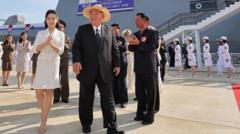As South Korea's presidential election approaches, the front-runner intends to recalibrate ties with North Korea and China after a period of heightened tensions under the previous administration.**
South Korea's Upcoming Presidential Election: A Shift in Foreign Policy on the Horizon**

South Korea's Upcoming Presidential Election: A Shift in Foreign Policy on the Horizon**
The leading candidates propose different diplomatic strategies, signaling a potential thaw in relations with North Korea and China.**
South Korea is on the brink of a significant transformation in its diplomatic approach with North Korea and China as the presidential election draws near. With the election set for June 3, the leading candidate, Lee Jae-myung, is expected to shift the nation’s foreign policy direction significantly if elected. This potential change comes in the wake of strained relations during former President Yoon Suk Yeol’s term, during which tensions escalated, particularly with North Korea, and diplomatic relations with China worsened.
Under Yoon’s presidency, South Korea adopted a confrontational stance towards North Korea, actively promoting the dissemination of foreign information into the isolated regime. This shift led to North Korea redefining South Korea as a rival, even contemplating military actions. Moreover, Yoon’s administration raised red flags about China's influence in domestic matters, which only exacerbated diplomatic tensions with Beijing, a critical trade partner for Seoul.
Lee Jae-myung, who is poised to win according to polling data, has voiced his intent to stabilize relationships with China and re-engage in dialogue with North Korea. "I will stabilize and manage relations," Lee asserted, a marked contrast to Yoon's more aggressive approach. This incoming administration, alongside Lee’s main opponent Kim Moon-soo, shares some similarities in their foreign policy visions, yet their specific strategies diverge significantly.
As the election date approaches, the implications of this potential policy shift could reshape South Korea’s role in the regional power dynamics and address the long-standing issues surrounding the North-South relationship.
Under Yoon’s presidency, South Korea adopted a confrontational stance towards North Korea, actively promoting the dissemination of foreign information into the isolated regime. This shift led to North Korea redefining South Korea as a rival, even contemplating military actions. Moreover, Yoon’s administration raised red flags about China's influence in domestic matters, which only exacerbated diplomatic tensions with Beijing, a critical trade partner for Seoul.
Lee Jae-myung, who is poised to win according to polling data, has voiced his intent to stabilize relationships with China and re-engage in dialogue with North Korea. "I will stabilize and manage relations," Lee asserted, a marked contrast to Yoon's more aggressive approach. This incoming administration, alongside Lee’s main opponent Kim Moon-soo, shares some similarities in their foreign policy visions, yet their specific strategies diverge significantly.
As the election date approaches, the implications of this potential policy shift could reshape South Korea’s role in the regional power dynamics and address the long-standing issues surrounding the North-South relationship.




















